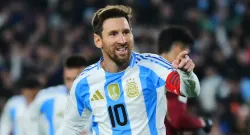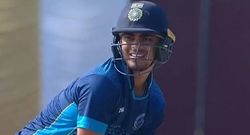
Picture Credit: BCCI
Indian all-rounder Stuart Binny on Monday announced his retirement from all forms of cricket with immediate effect. Binny, 37, played six Tests, 14 ODIs and three T20Is for India in his career. A career, which lasted over 20 years, Stuart Binny produced some memorable performances at both domestic and international levels. He still holds the record of best bowling figures by an Indian in ODIs.
We caught up with Stuart and learned about his cricketing journey and his next step after retirement.
Firstly, many congratulations on a great career Stuart. It has been a long journey. I want to start with some happy memories Stuart. Tell us about that feeling when you made your debut in Blues.
Stuart: It was a dream come true for me. Obliviously, from a small boy, I had always dreamt of playing for my country. And finally, the day came when I was handed my Test cap by MS Dhoni at Trent bridge in England. So, it was a special feeling for me. I look back at that moment when I received my cap, I look back at all the people that had helped me, all my coaches, all my friends, my family members. It was a very very special moment for me at that time.
You are the son of a World Cup winner and a world-class cricketer. Was there pressure on you at the start or it acted as a motivation?
Stuart: I think it was both. It was a mix of both. When I was a lot younger, about 14 or 15, obliviously, at that time it was pressure for me. But I think once I grew up and found out that I had the game and potential to play for India, I used it as an advantage to prove to people that I was good enough and I took it as a motivation for me to go out and perform, and let my bat and bowl do the talking instead of me doing the talking. I used it as a drive to move forward.
You notched up the record for the best bowling performance by an Indian in an ODI and yet you didn’t get many chances after that. How it affected you?
Stuart: I don’t think it affected me instead it motivated me to come back to Ranji Trophy cricket and do well. Obliviously, it was disappointing not to get a game for the next 6 months. I had to come back to Ranji Trophy cricket, and I never really went back to that Indian team. After 6 months, I returned for the 2015 World Cup in Australia. More than upset, it gave me a push to go to domestic cricket and perform once again and prove that I was still good enough to go out and perform.
We always talk about the mental pressure and nowadays, challenges for cricketers are not only on the field but off the field as well. Trolls, hecklers are always ready to get under the skin. How did you deal with it and how should a young cricketer face it?
Stuart: What I did was I totally kind of shut of what people had to say. From a very early age, I had a lot of people saying a lot of stuff about me, so it really did not affect what people said. I think it was more important what people, like my family, and the motivation they gave me that I took as positives. Yes, you have critics when you are playing cricket and it’s always nice to know some things that maybe you can change in your game, but if you really look at it, I never really paid much attention to social media or the trolls or what people were saying in the media at that time when I was playing. I was fully focused to do my best in my training and my matches. I would advise a young cricketer to stay as calm as possible and not get too much into social media. Yes, social media is important, but I don’t it plays a role as a sportsperson for you. It’s just something that passes your time after cricket.
You mentioned in your statement that cricket runs in your blood. Can we see baby binny in the blues in future?
Stuart: Haha. It is very early to say anything about him. He is just a year old. Obliviously, with cricket being in the family, he would love to try it out. My advice to him would be to enjoy whatever he does, whether it’s hockey or football or wrestling as long he is out there playing the sport, I will be happy, to be honest. He doesn’t have to go in the line of cricket, but if does happen, obliviously it will be a good thing.
What’s next for you? Do you see yourself coaching a team in the coming years? Or would you want to play foreign leagues now?
At the moment, I am looking to get into coaching. I want to get involved with state teams. I have played for two years in the North-East. The cricket is growing there and I would like to share my experiences with the young talent over there. But I am not closing the doors also to play leagues abroad. I think if the opportunity does come, I will have to take the decision when it comes and see if it makes sense to play at that time or coaching would be a better role. Definitely, both are open at this moment.
In the IPL you have represented few franchises in the past. Whose leadership did you enjoy the most and why?
Stuart: I enjoyed my time with Rajasthan Royals the most. I spent 7 years with them, and I played under few captains over there. Starting from Shane Warne to Rahul Dravid sir then Ajinkya Rahane, Steve Smith. I think I built a strong relationship with Rajasthan Royals. I would personally like to thank them for giving me the opportunity to express myself and to go out and do well in the IPL. As I keep saying, Rajasthan Royals is like a family to me and I would like to be associated with them in the future.




